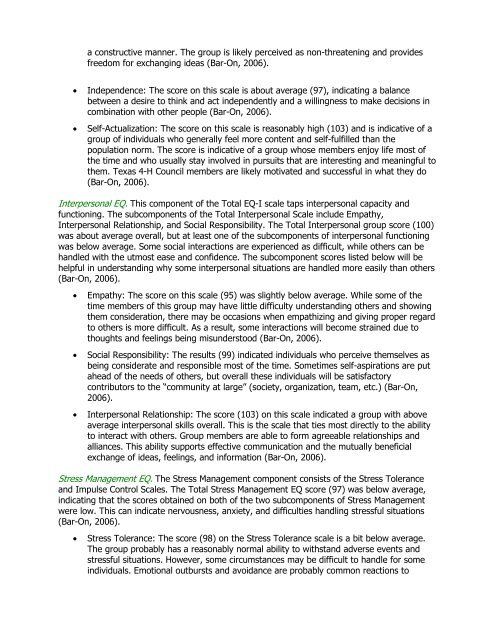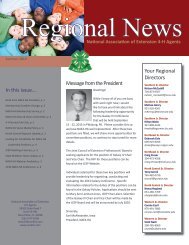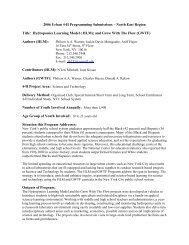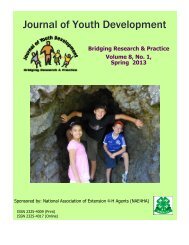Winter 2008 - Vol. 3 No. 3 - National Association of Extension 4-H ...
Winter 2008 - Vol. 3 No. 3 - National Association of Extension 4-H ...
Winter 2008 - Vol. 3 No. 3 - National Association of Extension 4-H ...
- No tags were found...
You also want an ePaper? Increase the reach of your titles
YUMPU automatically turns print PDFs into web optimized ePapers that Google loves.
a constructive manner. The group is likely perceived as non-threatening and providesfreedom for exchanging ideas (Bar-On, 2006).• Independence: The score on this scale is about average (97), indicating a balancebetween a desire to think and act independently and a willingness to make decisions incombination with other people (Bar-On, 2006).• Self-Actualization: The score on this scale is reasonably high (103) and is indicative <strong>of</strong> agroup <strong>of</strong> individuals who generally feel more content and self-fulfilled than thepopulation norm. The score is indicative <strong>of</strong> a group whose members enjoy life most <strong>of</strong>the time and who usually stay involved in pursuits that are interesting and meaningful tothem. Texas 4-H Council members are likely motivated and successful in what they do(Bar-On, 2006).Interpersonal EQ. This component <strong>of</strong> the Total EQ-I scale taps interpersonal capacity andfunctioning. The subcomponents <strong>of</strong> the Total Interpersonal Scale include Empathy,Interpersonal Relationship, and Social Responsibility. The Total Interpersonal group score (100)was about average overall, but at least one <strong>of</strong> the subcomponents <strong>of</strong> interpersonal functioningwas below average. Some social interactions are experienced as difficult, while others can behandled with the utmost ease and confidence. The subcomponent scores listed below will behelpful in understanding why some interpersonal situations are handled more easily than others(Bar-On, 2006).• Empathy: The score on this scale (95) was slightly below average. While some <strong>of</strong> thetime members <strong>of</strong> this group may have little difficulty understanding others and showingthem consideration, there may be occasions when empathizing and giving proper regardto others is more difficult. As a result, some interactions will become strained due tothoughts and feelings being misunderstood (Bar-On, 2006).• Social Responsibility: The results (99) indicated individuals who perceive themselves asbeing considerate and responsible most <strong>of</strong> the time. Sometimes self-aspirations are putahead <strong>of</strong> the needs <strong>of</strong> others, but overall these individuals will be satisfactorycontributors to the “community at large” (society, organization, team, etc.) (Bar-On,2006).• Interpersonal Relationship: The score (103) on this scale indicated a group with aboveaverage interpersonal skills overall. This is the scale that ties most directly to the abilityto interact with others. Group members are able to form agreeable relationships andalliances. This ability supports effective communication and the mutually beneficialexchange <strong>of</strong> ideas, feelings, and information (Bar-On, 2006).Stress Management EQ. The Stress Management component consists <strong>of</strong> the Stress Toleranceand Impulse Control Scales. The Total Stress Management EQ score (97) was below average,indicating that the scores obtained on both <strong>of</strong> the two subcomponents <strong>of</strong> Stress Managementwere low. This can indicate nervousness, anxiety, and difficulties handling stressful situations(Bar-On, 2006).• Stress Tolerance: The score (98) on the Stress Tolerance scale is a bit below average.The group probably has a reasonably normal ability to withstand adverse events andstressful situations. However, some circumstances may be difficult to handle for someindividuals. Emotional outbursts and avoidance are probably common reactions to






